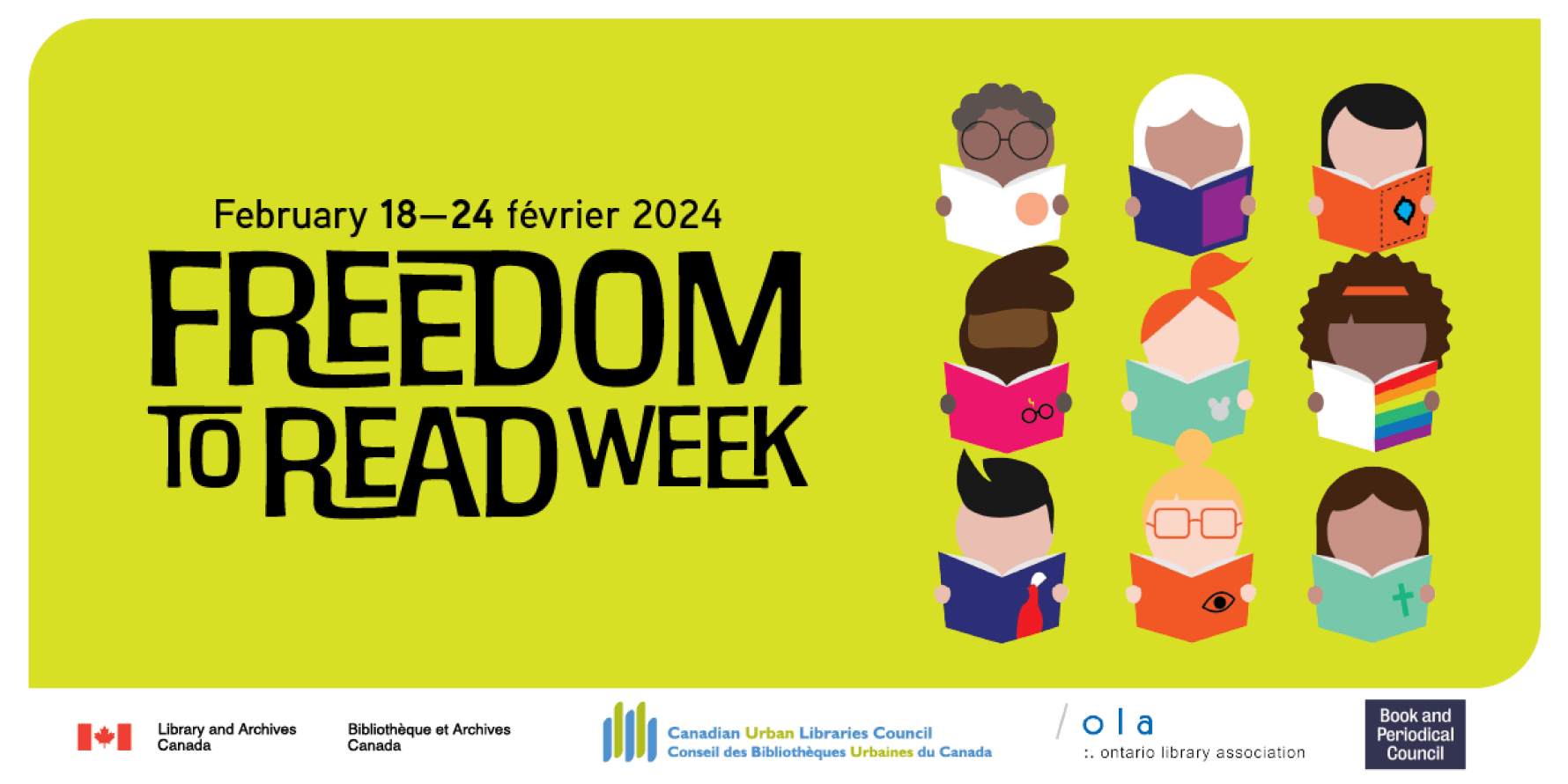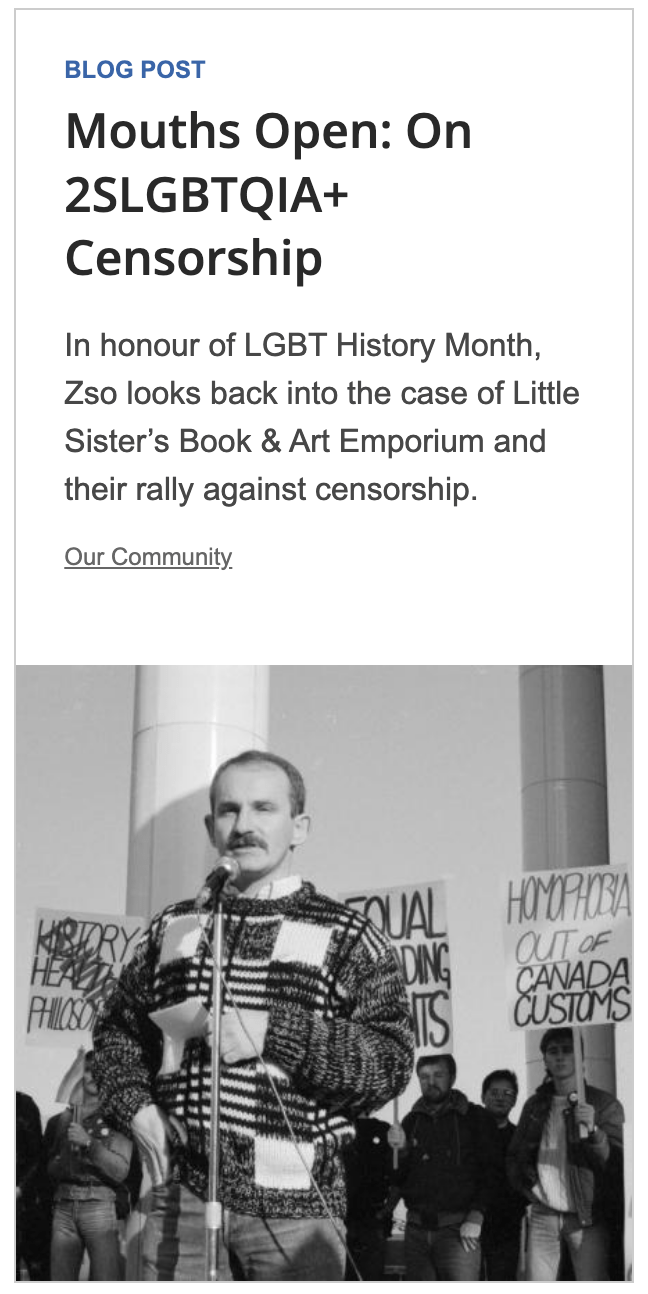
Written by Erin, Collection Development Librarian
Originally published February 2023, Updated February, 2024
Have you ever stopped to think about how incredibly important it is that you have the freedom to read any book, magazine, newspaper, or information resource you choose? I encourage you to take a moment right now to think about the last book you read—did Library staff stop you from borrowing that book? Did book store staff refuse to sell you a copy?
Imagine now, if you were refused a copy of a book because someone else decided what you could, or could not read.
Unrestricted access to read anything we want and to form our own opinions is intellectual freedom, and many of us take it for granted.
What is Intellectual Freedom and Freedom to Read?
Intellectual freedom is the right to access information and ideas from all points of view without restrictions. At the core of intellectual freedom is the belief and trust that people have the ability to assess and analyze information and ideas in order to make informed decisions. In Canada, our intellectual freedom rights are protected by the Canadian Charter of Rights and Freedoms, opens a new window.
To help Canadians recognize and reflect on the importance of intellectual freedom, and to bring awareness to censorship, Freedom to Read Week was developed. Freedom to Read Week is an annual celebration that encourages Canadians to think about and reaffirm their commitment to intellectual freedom (Freedom to Read, 2023, opens a new window). Additionally, Banned Books Week, opens a new window takes place every year in late September or early October. The annual event highlights the value of free and open access to information and brings together the entire book community — librarians, educators, authors, publishers, booksellers, and readers of all types — in shared support of the freedom to seek and to express ideas.
But don’t let these two one-week celebrations fool you—we should be committed to intellectual freedom year-round.
Public Libraries and Intellectual Freedom
Your public library is a defender of intellectual freedom every day of the year. Not only are we legally required to uphold the Canadian Charter of Rights and Freedoms, which protects intellectual freedom, we also believe that access to a wide variety of ideas, information, opinions, perspectives, and stories helps create a more informed, empathetic, and curious community.

Sometimes, libraries are asked to remove a certain book, magazine, or movie. Removing a book because someone objects to its content is a very slippery slope, because every book has the potential to upset or anger someone. For every book published, there are countless opinions about its content. This is why it is the Canadian Court of Law that determines which books are restricted, and not your local library. Libraries are not here to tell you what you can and cannot read. We are here to uphold intellectual freedom and to support people’s curiosity at every stage of life.
Without Intellectual Freedom We Risk Censorship
While it is not currently common for books to be banned in Canada, we only have to look so far as to our neighbours in the south to see how quickly things can change when intellectual freedom is not valued or understood by society as a whole. Across the United States, there is a concerted effort to ban books by people who do not respect or understand intellectual freedom. Although intellectual freedom is protected by the First Amendment in the United States, schools and public libraries are being forced to remove books—in other words, voices and experiences, and histories are being censored. The majority of the books being removed, the voices being silenced, are voices that have fought for years to be heard— particularly members of the BIPOC and 2SLGBTQIA+ communities. If you want to learn more about what is happening in the United States, I recommend you start with this webpage by PEN America, opens a new window.
We may feel like we can breathe a sigh of relief because we are in Canada, but libraries across Canada have also reported an increase in requests for books to be removed from public access (CFLA-FCAB 2021 Survey Report, opens a new window). To learn more about the book challenges that are occurring here in Canada, I recommend you check out the Intellectual Freedom Challenges reports from the Canadian Federation of Library Associations, as well as the Library Challenges Database, opens a new window from the Centre for Free Expression at Toronto Metropolitan University, and the Challenged Works, opens a new window webpage by Freedom to Read Canada.
Intellectual Freedom and You
I don’t know about you, but I love living in a society where I have the freedom to read, watch, and listen to just about anything I want. To be able to access a full range of voices and information without fear of repercussions is incredible.
This right is not equally shared across the world, and has been at the centre of conflict throughout history, and even today in 2023. As a librarian, I am dedicated to defending and supporting intellectual freedom. We cannot afford to take intellectual freedom for granted, and I believe it is our collective responsibility to protect it. And so I implore you, please take a moment to really think about the importance of intellectual freedom and freedom to read. Read about it, talk about it with friends and family, and join your voice to ours, your public library.
Additional Resources
Here are some additional resources to help support your own curiosity about intellectual freedom, freedom to read, and censorship (book banning):
Statement on Intellectual Freedom and Libraries, Canadian Federation of Library Associations
Section 2(b) –Freedom of Expression, Canadian Charter of Rights and Freedoms
Library Challenges Database, Centre for Free Expression, Toronto Metropolitan University
Challenged Works, Freedom to Read Canada
Intellectual Freedom Challenges reports, the Canadian Federation of Library Associations (CFLA-FCAB)
Top 10 Most Challenged Books Lists, American Library Association
Banned in the USA: The Growing Movement to Censor Books in Schools, PEN America
Intellectual Freedom: Issues and Resources, American Library Association
Why Some Books are Banned , Murrieta Library
Why Are These Books in My Library? American Library Association
Further reading



Add a comment to: The Freedom to Read What We Want: How Glorious is That!